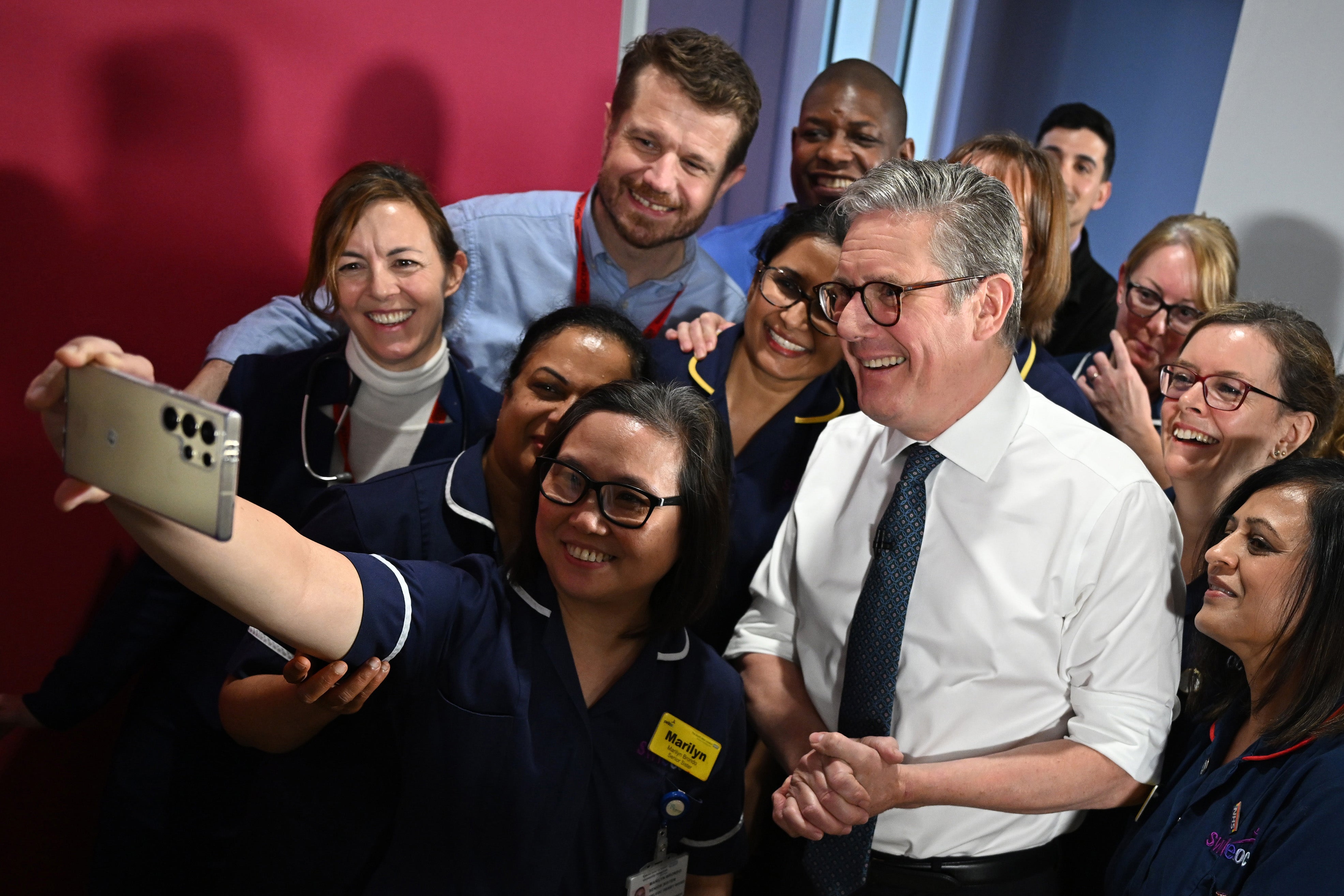Starmer warned NHS overhaul will not work without fixing staff shortage
Labour has unveiled a plan to overhaul the NHS - but experts say staff retention needs to be a major focus to tackle crippling waiting lists
Your support helps us to tell the story
From reproductive rights to climate change to Big Tech, The Independent is on the ground when the story is developing. Whether it's investigating the financials of Elon Musk's pro-Trump PAC or producing our latest documentary, 'The A Word', which shines a light on the American women fighting for reproductive rights, we know how important it is to parse out the facts from the messaging.
At such a critical moment in US history, we need reporters on the ground. Your donation allows us to keep sending journalists to speak to both sides of the story.
The Independent is trusted by Americans across the entire political spectrum. And unlike many other quality news outlets, we choose not to lock Americans out of our reporting and analysis with paywalls. We believe quality journalism should be available to everyone, paid for by those who can afford it.
Your support makes all the difference.The country’s largest medical union has issued a stark warning on Labour’s planned NHS overhaul, claiming ongoing staffing pressures could undermine ambitious plans to reduce cut waiting lists.
Latest figures published by NHS England reveal there were 32,000 nurse vacancies last year, while Lord Darzi’s report last month showed there were almost 16 per cent fewer qualified GPs in UK than other comparitive countries.
The British Medical Association (BMA) fears the shortage could be worsened if Labour fails to focus on retaining staff - and has warned that a lack of staff could jeopardise the party’s plan to roll out more surgical hubs and extend the hours of community diagnostic centre hours.
“In terms of medical staff, if you're taking medical staff from hospitals to work in a surgical hub or community diagnostic centre you’re just shuffling around the same people,” BMA consultant co-lead Dr Helen Neary told The Independent.
Labour’s plan to reform the NHS with the goal of reducing wait times from 18 months to 18 weeks by March 2029 was unveiled by Sir Keir on Monday. He set out a plan to improve patient access to care across England by providing “millions of extra appointments” and services that treat patients more quickly, closer to where they live.

The plan included building 17 additional or expanded surgical hubs and extending community diagnostic centre operating hours and increasing their testing scope.
But Dr Neary warned of current shortages across the NHS, with the latest figures published by the NHS showing nearly 31,000 vacancies for nursing in September, although this is down from just over 42,000 vacancies the year before.
The Lord Darzi report show there are almost 16 per cent fewer fully qualified GPs in the UK than other high-income countries relative to our population, and the number of nurses working in the community fell by at least 5 per cent between 2009 and 2023.
The number of mental health nurses has also returned to its 2010 level.
The Royal College of Nursing said more investment was required to retain and attract workers. General secretary and chief executive Professor Nicola Ranger told The Independent the nursing workforce the “missing link” in Labour’s plans.
She said: “Patients are waiting too long for treatment and modernisation in the NHS is needed. But the missing link in all of this is the nursing workforce.
“We desperately need new investment in our workforce otherwise all attempts to improve patient care and modernise the NHS will never get off the ground.”
The BMA said staff retention should be a a main focus of Labour, as should increasing the number of places in training programmes to provide more career pathways for a greater number of doctors.
“We need to make medicine an attractive career,” Dr Neary said.
University of Glasgow professor of comparative politics, Sergei Pardos-Prado, said pay and conditions needed to be improved to improve the workforce, ash he revealed applications for nursing fell last year for a third year in a row.
Prof Pardos-Prado said other incentives to boost nursing enrollments could include government help with tuition fees.
“Improving pay and conditions is a fundamental step to make professional careers in the NHS more attractive in the long run,” he said. “However this also needs to be complemented with interventions to increase the productivity of existing staff.”
NHS national medical director Professor Sir Stephen Powis said part of the staffing solution was also managing patients and workloads differently, aided by planned upgrades to the NHS app, the ability for GPs to directly refer some patients for diagnostics and the increases in surgical hubs that sit separate to hospitals.
“Staff are incredibly important in the NHS. It’s why 18 months ago, we set out a new long term workforce plan to expand staff working in the health service, and we’re working hard on that,” he said on BBC Radio 5 on Monday,
“We’re looking with the new government at how that works and how we might have to modify that.”
Health Minister Karin Smyth admitted that workforce was an issue in the NHS, but hoped that the expanded range of services could encourage more workers to stay,
"Well, we know that workforce is a problem in the system, but we also know that people are working in really dreadful conditions,” she told Times Radio on Monday.
“We know that some of these locations will actually be attractive for staff to work in because of where they are, the sorts of work they're doing, because it's routine work, particularly focused on electives, rather than being in hospital.”
Join our commenting forum
Join thought-provoking conversations, follow other Independent readers and see their replies
Comments